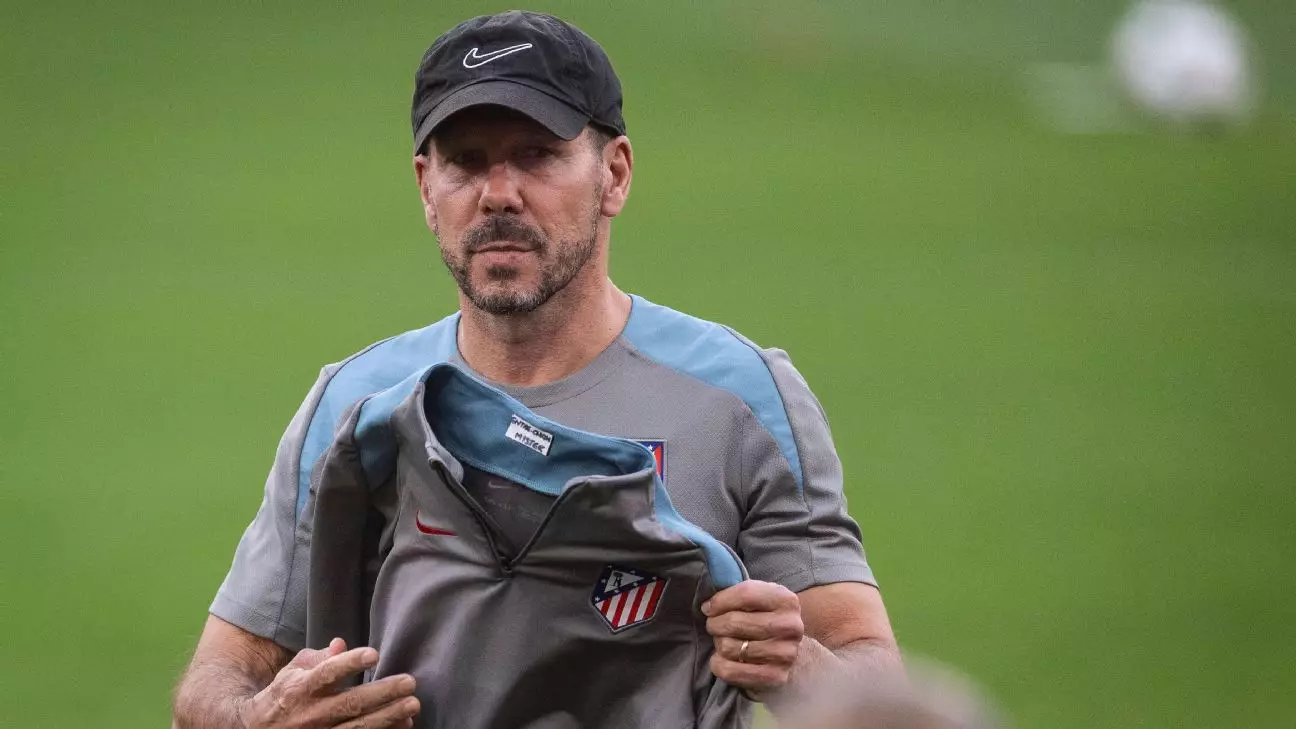The recent clash between Atlético Madrid and Real Madrid turned into a tumultuous event, overshadowed by the actions of fans and the subsequent fallout. In a game that should have been primarily focused on athleticism and competition, external factors infiltrated the experience when certain home supporters launched objects at Real Madrid’s goalkeeper, Thibaut Courtois. This unsporting behavior not only disrupted the match but also brought into question broader themes surrounding fan conduct and player responsibilities during high-stakes encounters.
Atlético Madrid’s coach, Diego Simeone, ignited a firestorm of debate following his comments regarding the incident. He suggested that players who provoke fans during matches should face consequences. While it is essential to recognize the latent tensions between rival fans, Simeone’s remarks raise significant issues about accountability. Celebrations in front of passionate supporters are often charged moments; this tension, while a natural part of sports culture, can quickly escalate into animosity.
Simeone’s suggestion that athletes should temper their reactions to avoid provoking fans can be seen as a double-edged sword. On one hand, there is merit in promoting a respectful sports culture, particularly in an age where fan behavior is scrutinized more closely than ever. On the other hand, placing the onus of responsibility on players for how supporters react could dilute the accountability of fans themselves. Emphasizing player restraint may inadvertently absolve fans of the consequences of their actions.
The immediate aftermath of Simeone’s statements unleashed a torrent of public reaction. Supporters and analysts alike took to social media and traditional media platforms to voice their opinions, often interpreting Simeone’s comments as a shift towards victim-blaming rather than a call for collective accountability. His assertion that he spoke for a majority brought into focus a vital aspect of sportsmanship: the notion that athletes and fans co-exist in a delicate balance of emotional investment.
In defending his comments, Simeone underscored his belief that football is an evolving societal context where certain behaviors cannot be ignored. He claimed that he was misinterpreted, depicting his position as one that champions a nuanced dialogue on behavior in football rather than simply denouncing fan aggression.
Following the derby incident, Atlético Madrid took immediate action by announcing the ban of a supporter involved in the object-throwing, a step that signifies a responsible stance in tackling fan misconduct. However, the club must further examine its role in cultivating an environment where respect prevails. The proactive measures taken against offenders are crucial, but they should extend beyond punitive actions to encompass educational initiatives aimed at fostering a more respectful atmosphere among supporters.
Moreover, the relationship between clubs and their fans must be built on shared responsibility. While clubs are inherently linked to their supporters, the behavior of their fans often reflects the culture instilled by the club itself. Beyond banning individuals, Atlético Madrid—as well as other clubs—should initiate dialogues regarding fan behavior, merging the police’s efforts with community engagement strategies to reinforce positive interactions.
In the weeks following the incident, it is paramount that Atlético Madrid, along with other clubs, takes a reflective approach to this pressing concern of fan behavior and player interactions. Addressing the root causes of hostility within the stands should become a priority. This involves acknowledging that while players can influence the atmosphere, they are not responsible for the actions of unruly fans.
Ultimately, the challenge lies in balancing the passionate culture of football with the necessity for safety and respect—principles that must transcend rivalries. As the dialogue around these incidents continues, it is vital for all stakeholders—players, coaches, clubs, fans, and the media—to engage in constructive conversations that pave the way for a more harmonious football experience.
In this multifaceted endeavor, the potential for positive change within the sport remains vast; it is only through collective accountability and open discussions that the football community can thrive while safeguarding the integrity of its passionate culture.

Leave a Reply